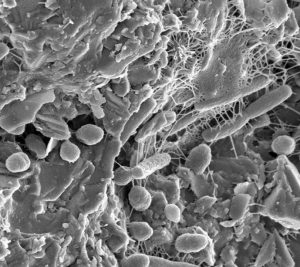
Recently, many veterinary publications have unveiled the importance of intestinal microbiome and novel tests to further investigate this are currently offered by diagnostic laboratories. But what actually is microbiome? Why is it important? How can it be useful in practice? Here is a summary of the most recent literature about microbiome, which perhaps will help to give you a broader understanding of this topic. Enjoy!
INTESTINAL MICROBIOME/MICROBIOTA: It is a community of microorganisms living in the gut of companion animals, and including bacteria, fungi, protozoa and archaebacteria. This complex ecosystem is considered to be a metabolic organ that plays an essential role in both gastrointestinal and general health of our pets. At birth, the gut is sterile and neonatal acquisition of intestinal microbiota happens in the first hours and days of life, influenced by the maternal and environmental microbial composition.
MICROBIOMICS: Novel research field focused on identification of the constituents of microbiome, analysis of microbial genome and interaction between the host and microbiome. In the past, bacterial culture was the most commonly used method to study intestinal microbial colonization, and it is still useful to detect specific pathogens. However, this technique underestimates the number of bacteria and it doesn’t allow identification of their genome. Currently, identification of bacteria is obtained by amplification and sequencing of 16S ribosomal gene (a gene region that differs between species), followed by comparison to reference microbial genomic database. Due to these molecular tools, it is now well known that there is extreme variability in the microbial composition of different intestinal tracts and among subjects. Bacterial diversity is critical for host health.
UTILITY OF MICROBIOME: Intestinal microbiome is part of the intestinal barrier and it contributes to host immunity. Moreover, gut microbes help in the digestive process, they are involved in the synthesis of vitamin K, folate and vitamin B12 and provide nutrition for enterocytes. Human studies highlighted the relationship existing between intestinal microbiome and obesity, neoplasia and brain development, and veterinary research is also exploring these areas.
DYSBIOSIS: Changes in the intestinal microbiome composition associated with various gastrointestinal diseases, such as acute diarrhoea, chronic enteropathies and antibiotic responsive diarrhoea. Dysbiosis is characterized by reduction of microbial diversity, shifts in the relative proportion of particular organisms (decrease or absence of important commensals) and /or altered microbiota functions. Intestinal dysbiosis can be now characterized measuring the total bacterial count and quantifying the percentages of selected bacterial species (Escherichia coli, Faecalibacterium prausnitzii, Fusobacteria sp, Blautia sp, Turicibacter spp., Clostridium hiranonis). This test is currently available at out laboratory. To date, no universal pattern of dysbiosis has been identified, however some recent studies have demonstrated significant changes in intestinal bacteria distribution in dogs, with decreased mucosal integrity, EPI and intestinal inflammation. Inconsiderate use of antibiotics promotes decreased bacterial diversity and can lead to an increase in potentially pathogenic bacteria. Intestinal dysbiosis is well established component of chronic enteropathies, however it could be either the cause for the clinical signs or the result of underlying histological inflammatory process, therefore it cannot be used to differentiate the primary GI condition.
HOW TO TREAT DYSBIOSIS: Therapeutic indications on how to modify animal intestinal microbiome are derived from human medical literature, and they include:
- Diet: it has been proved that novel protein, hydrolysed and high fibre content diets are an important component of any dysbiosis treatment in dogs and cats.
- Administration of prebiotics: these are mostly plant-derived polysaccharides that are fermented by bacteria and provide essential nutrients for intestinal mucosa.
- Use of probiotics: these are formulations of selected strains of live bacteria that have beneficial effects on the recipient when given in adequate amounts.
- Antibiotic treatment: cautious administration of selected antibiotics can lead to microbiome manipulation.
- Faecal microbiome transplantation: this treatment is still subject of study and there is currently not enough data regarding safety, efficacy, indications of use and delivery methods.
CONCLUSIONS: Molecular diagnostics allow a better overview of the intestinal microbiome, which is a viable diagnostic and therapeutic target for a variety of GI disease. However, little is known about the complex interaction between microbiome and host, the microbiome role in the pathogenesis of disease states and therefore the practicality of diagnostic tests and therapies for conditions associated with dysbiosis. Veterinary research is currently aimed to encompass these topics.
DYSBIOSIS TESTING AVAILABLE AT BATTLAB:
DYSBIOSIS ANALYSIS: Faecal analysis that quantifies the most important microbiome components. It provides ONLY copy numbers of key bacteria.
- Sample required: fresh faeces
- Technique: PCR
- Species: DOGS, CATS and EQUINE
- Turnaround time: up to 8-10 working days
- BATTLAB code: DYSA
- Price: upon request
- Interpretation: copy numbers of the key bacteria below the reference values indicate dysbiotic conditions of the intestinal microbiome
DYSBIOSIS PROFILE: More comprehensive faecal analysis that quantifies key bacteria (as the above) + parasitological examination + mycological examination + measurement of CALPROTECTIN (non-invasive biomarker of intestinal inflammation) and pancreatic elastase (canine only)/ microscopic nutritive digestion analysis (feline only).
- Sample required: fresh faeces
- Techniques: PCR (microbiome) + immunoenzymatic test (calprotectin) + for canine profiles pancreatic elastase
- Species: DOGS and CATS
- Turnaround time: up to 8-10 working days
- BATTLAB code: DYSP
- Price: upon request
- Interpretation: copy numbers of the key bacteria below the reference values indicate dysbiotic conditions of the intestinal microbiome. Increased calprotectin indicates intestinal inflammation. Pancreatic elastase is a functional test aimed to rule out exocrine pancreatic insufficiency in dogs.
If you want to know more about microbiome and the dysbiosis profiles available at BattLab, do not hesitate to contact us.